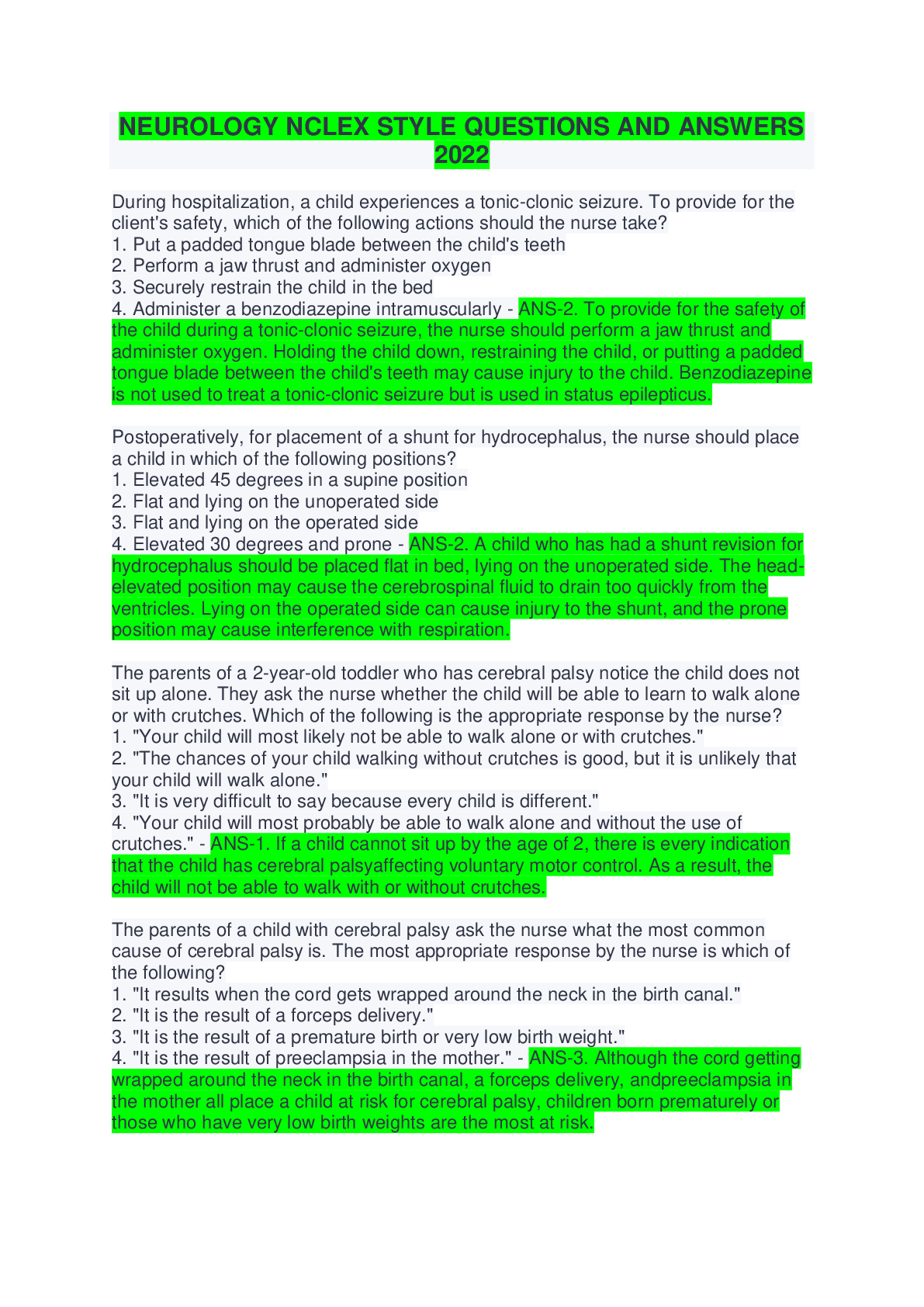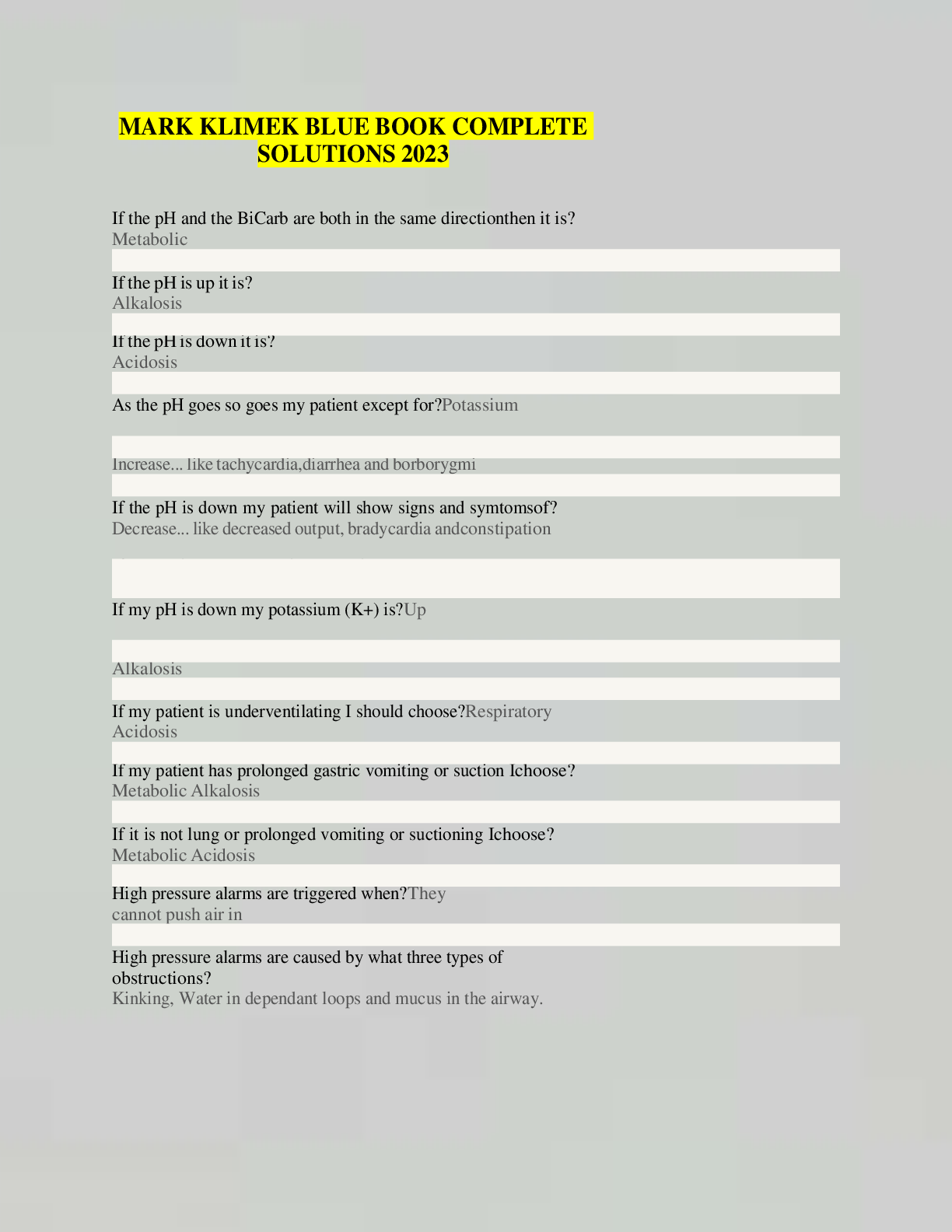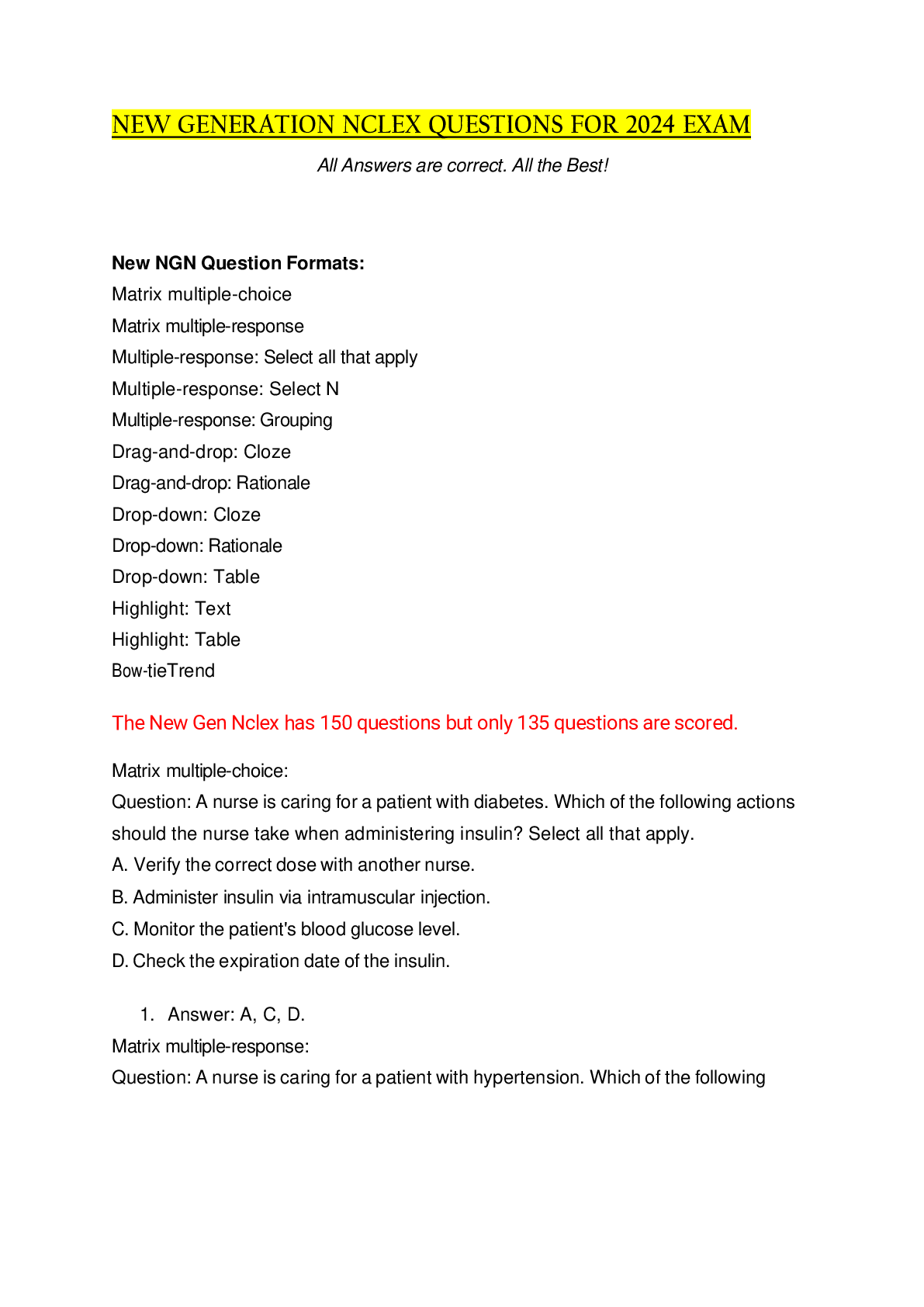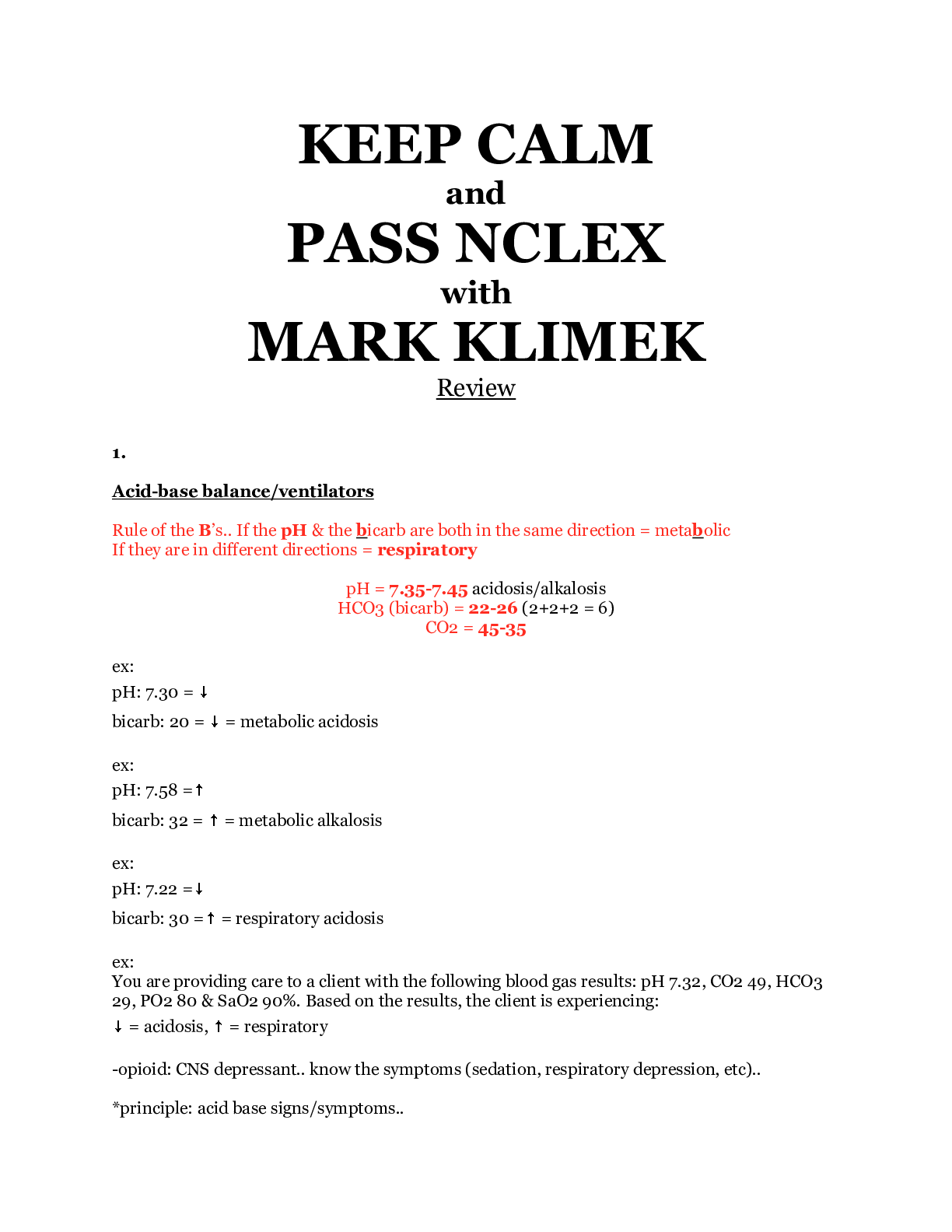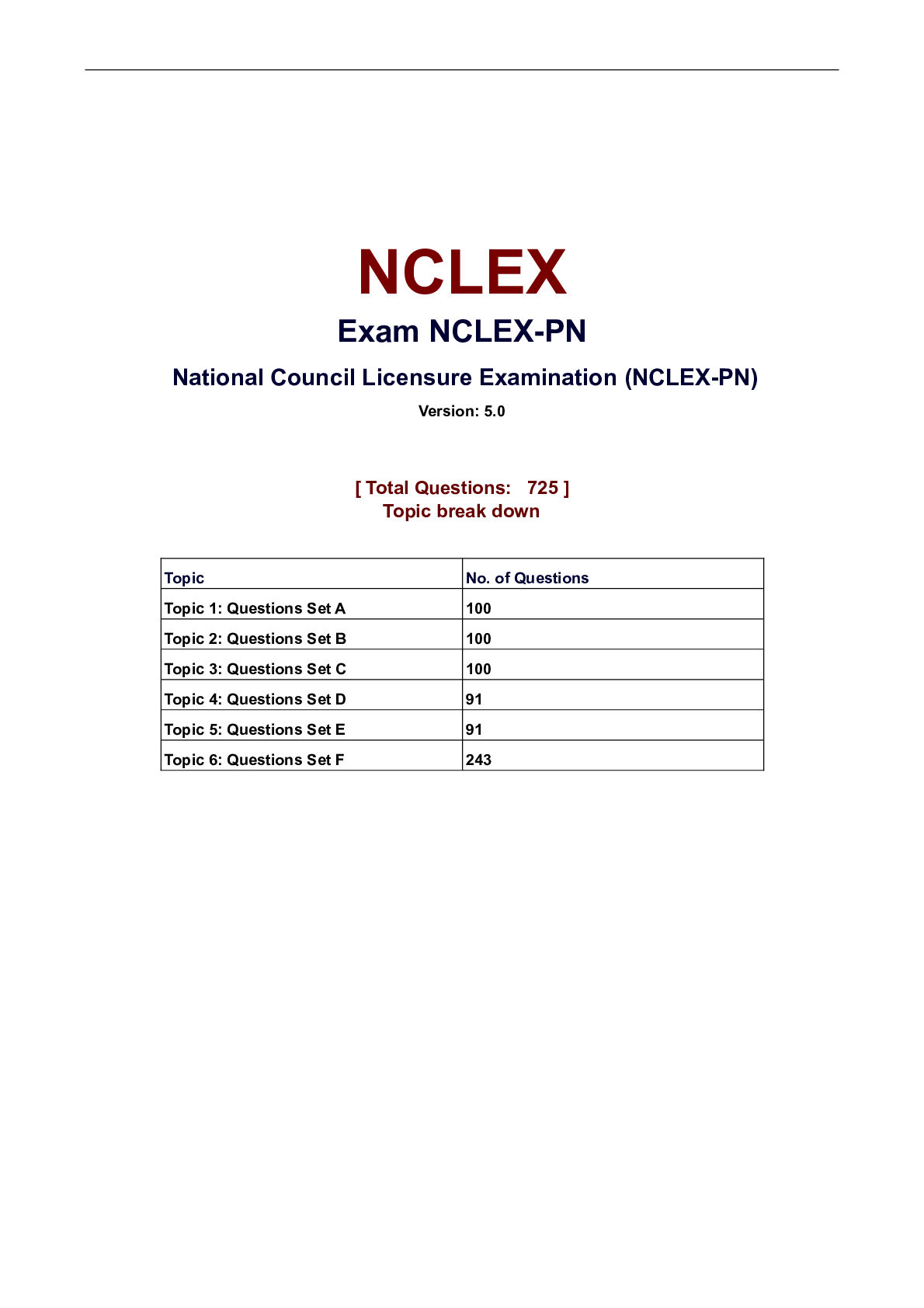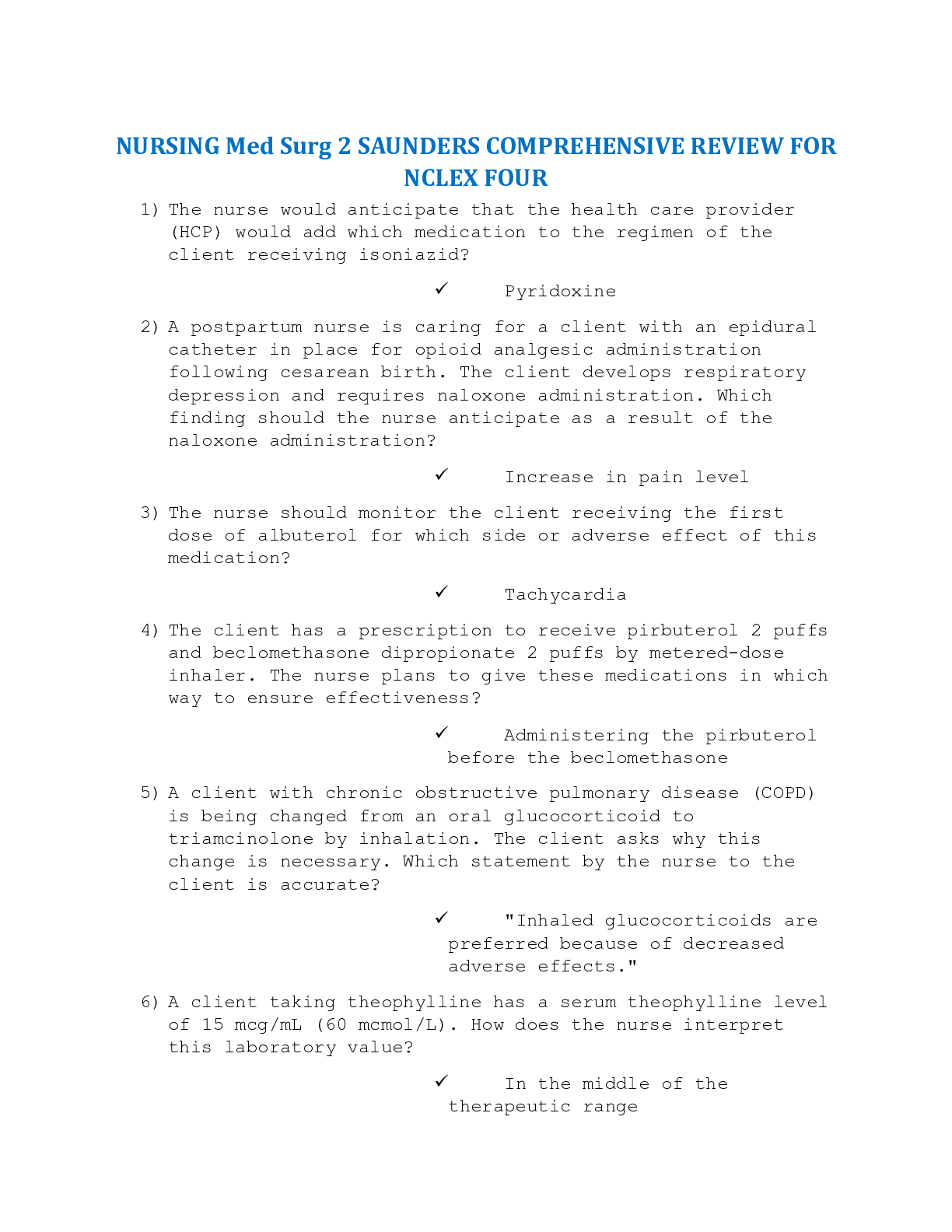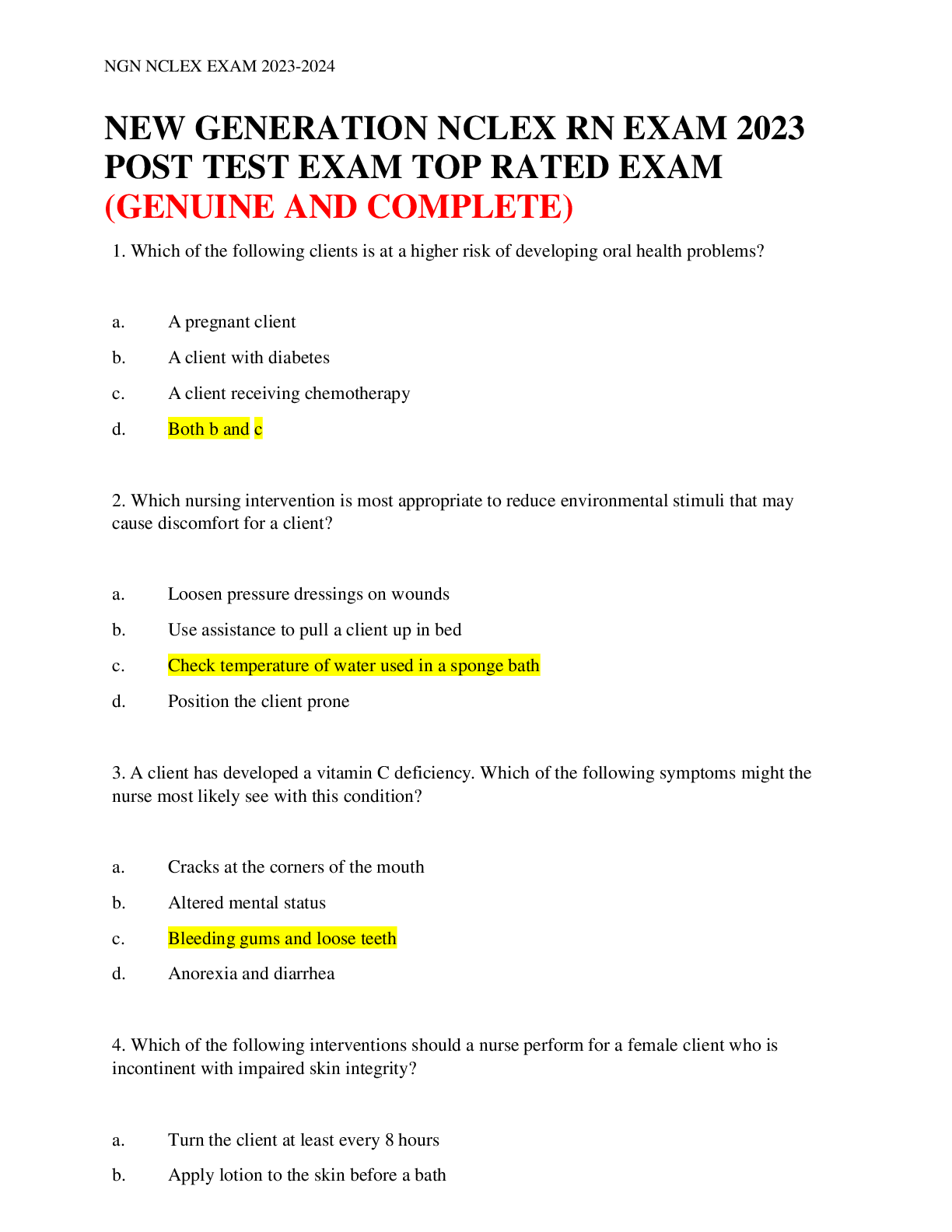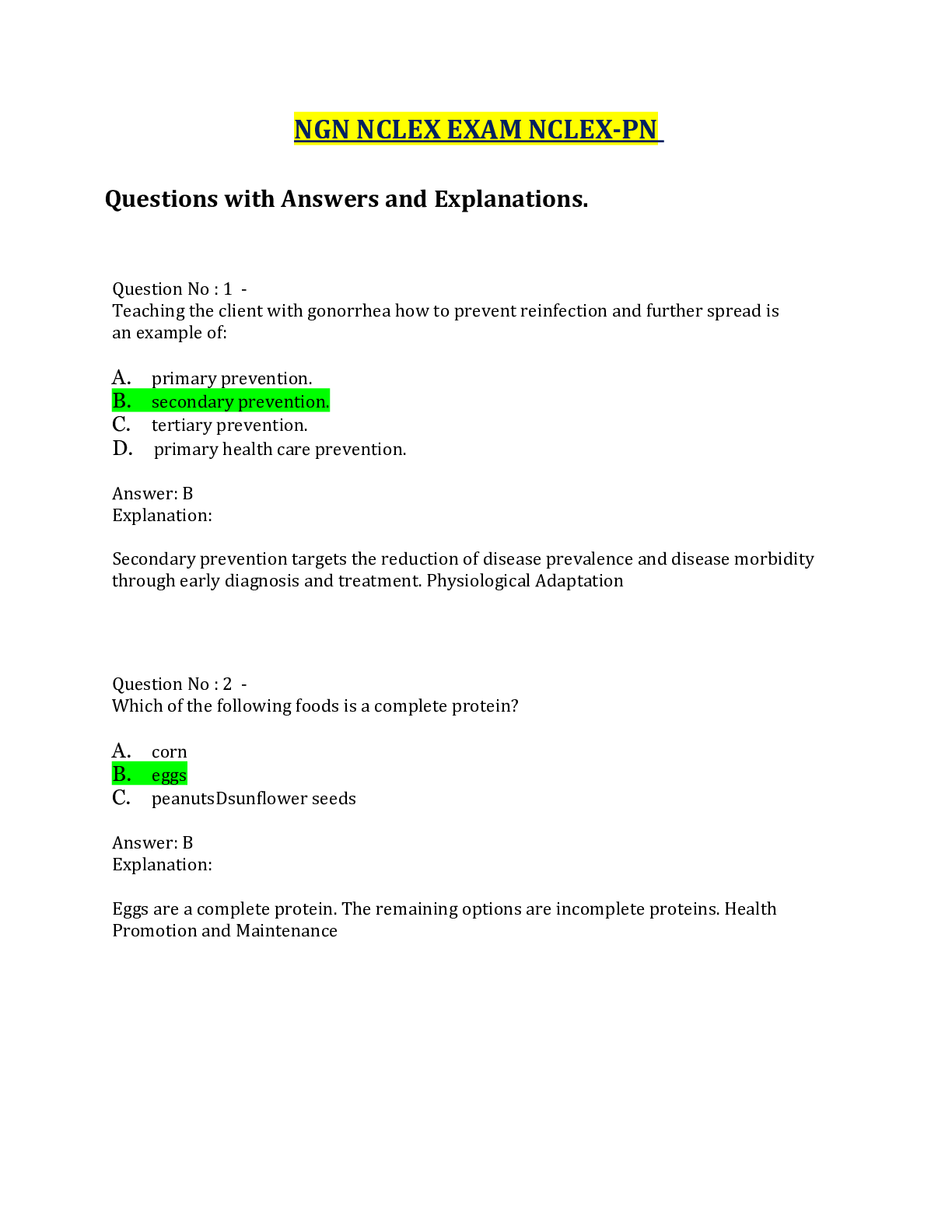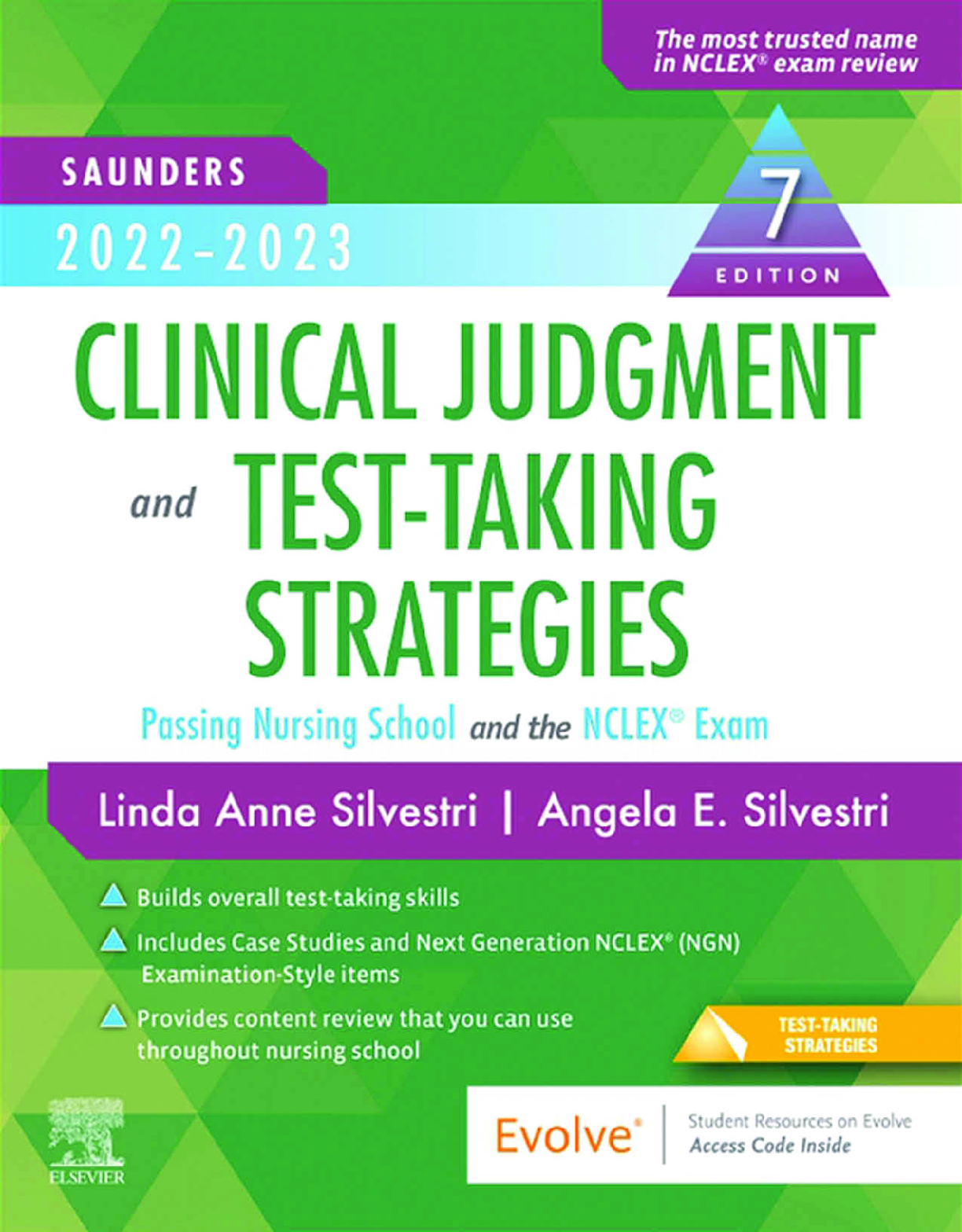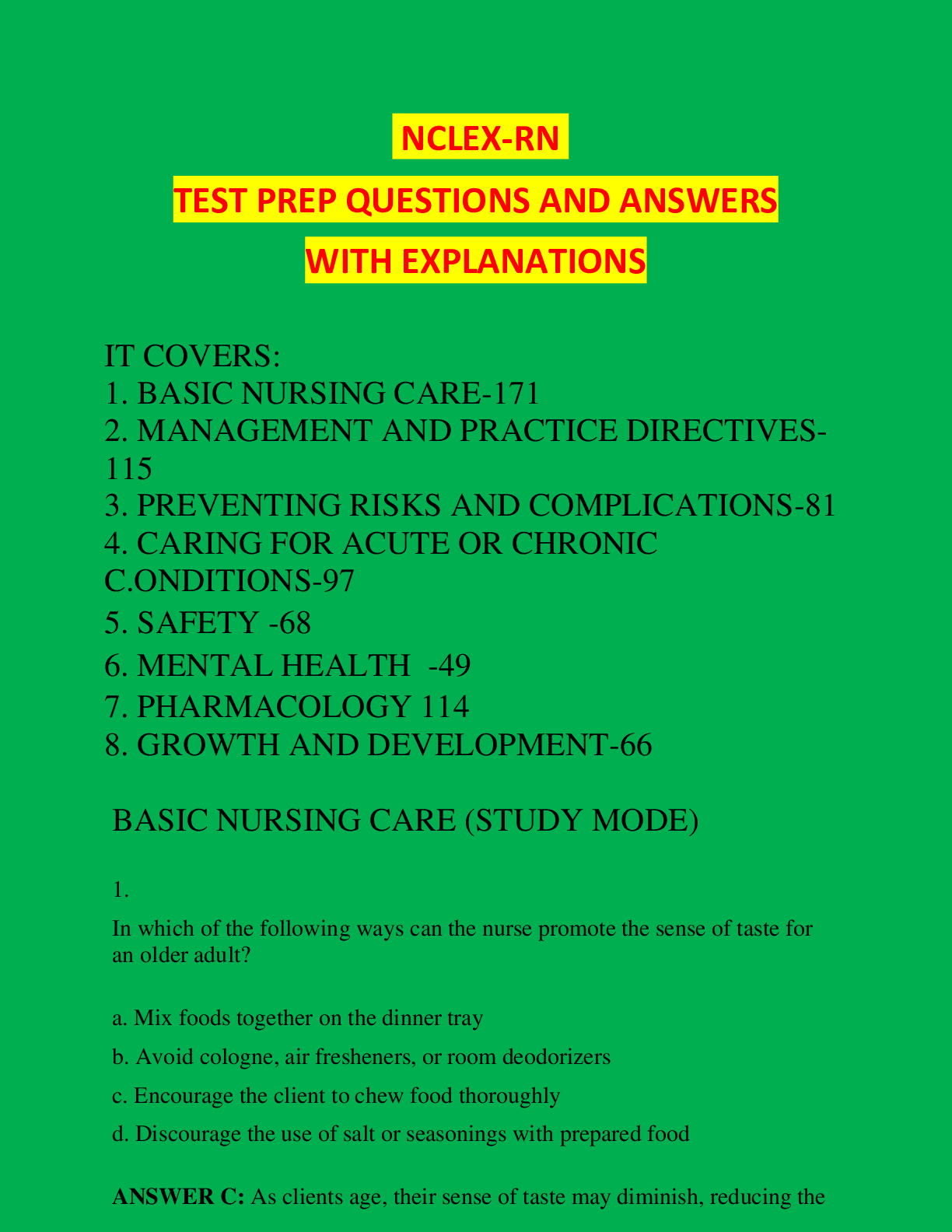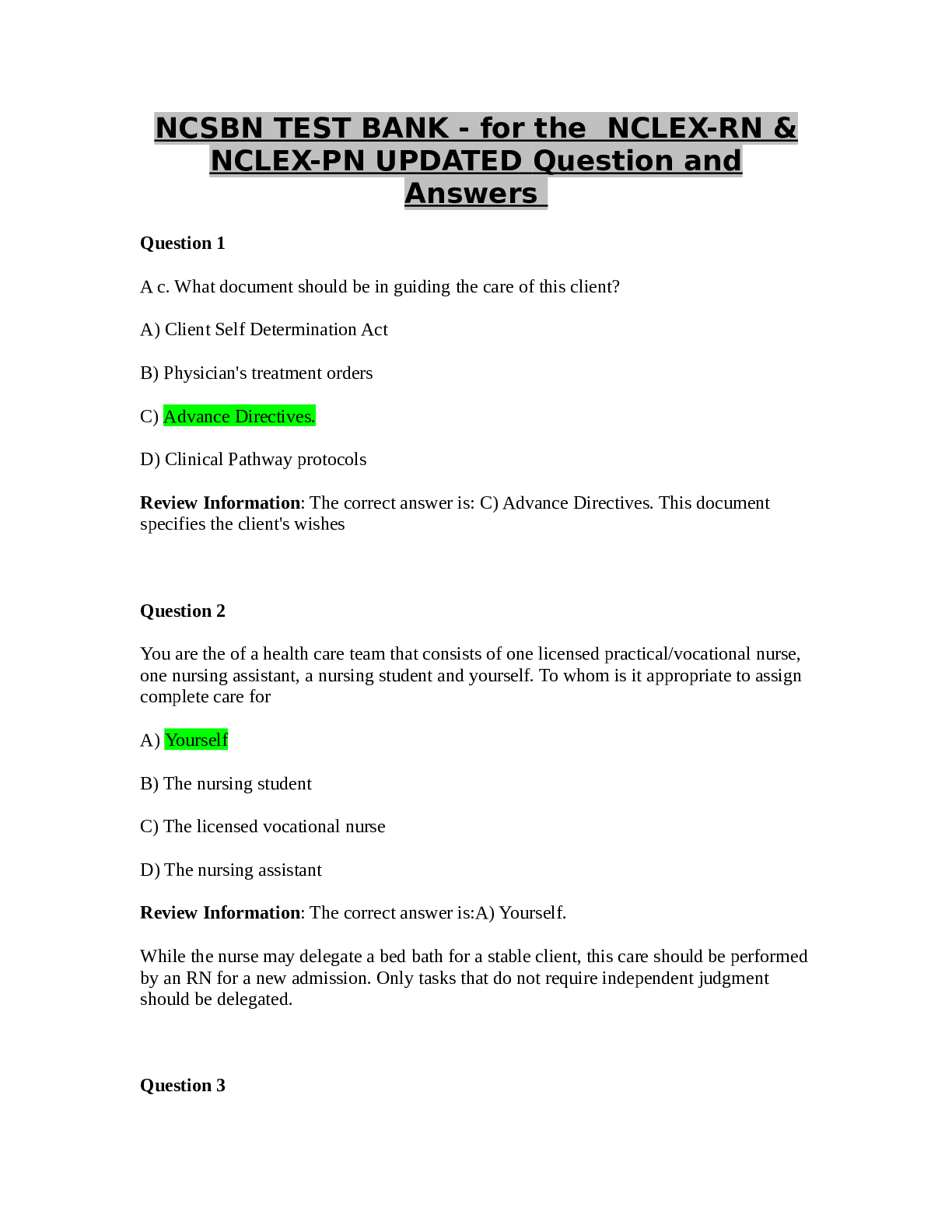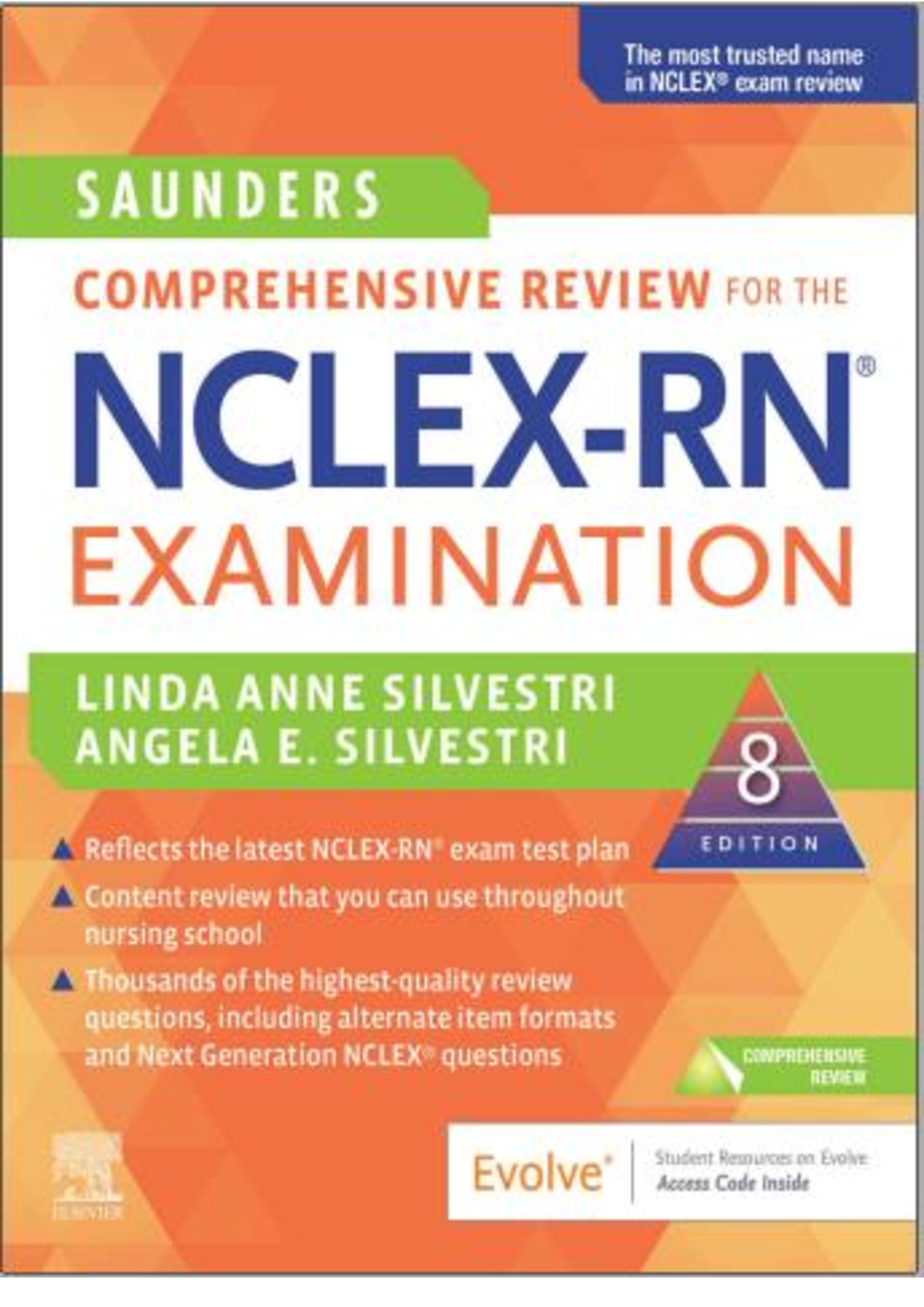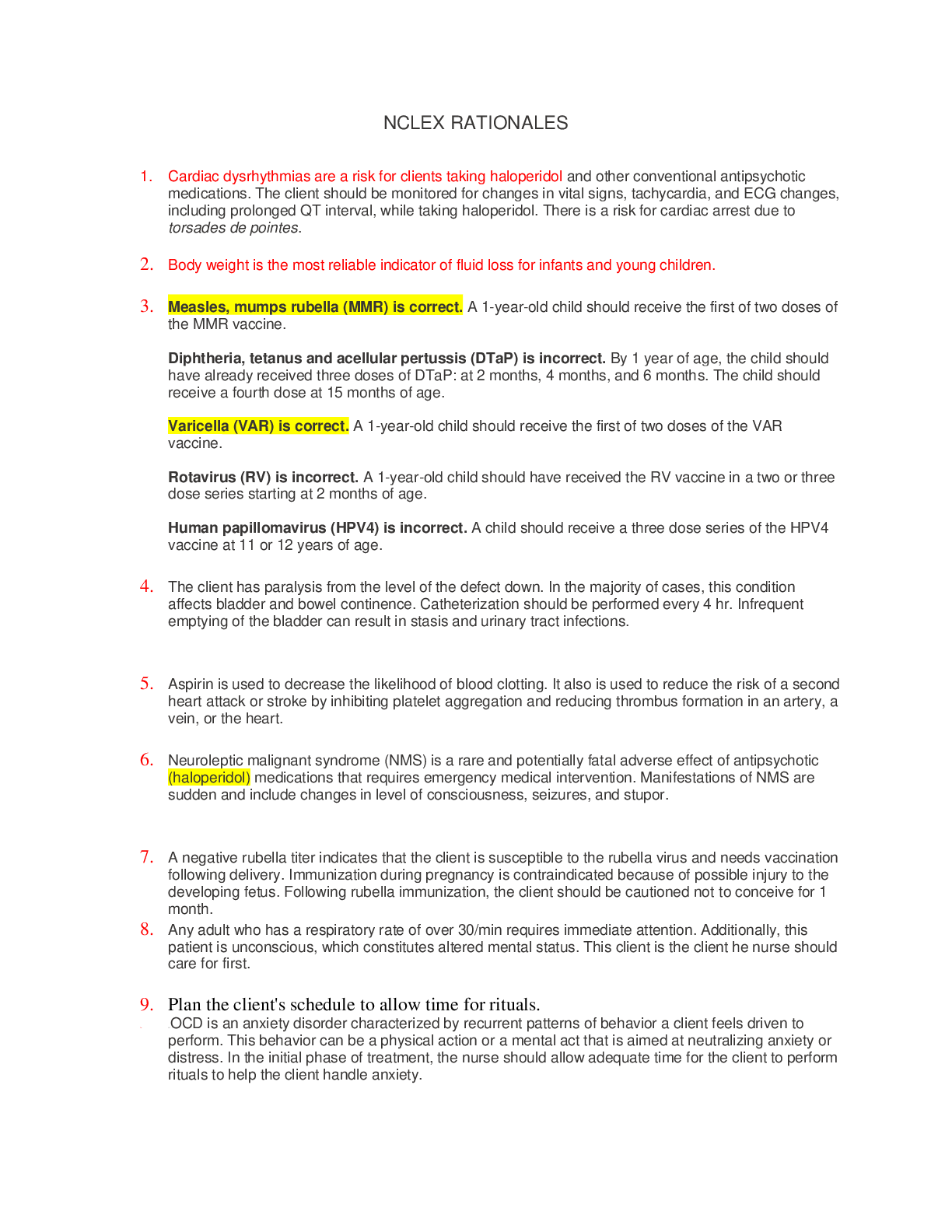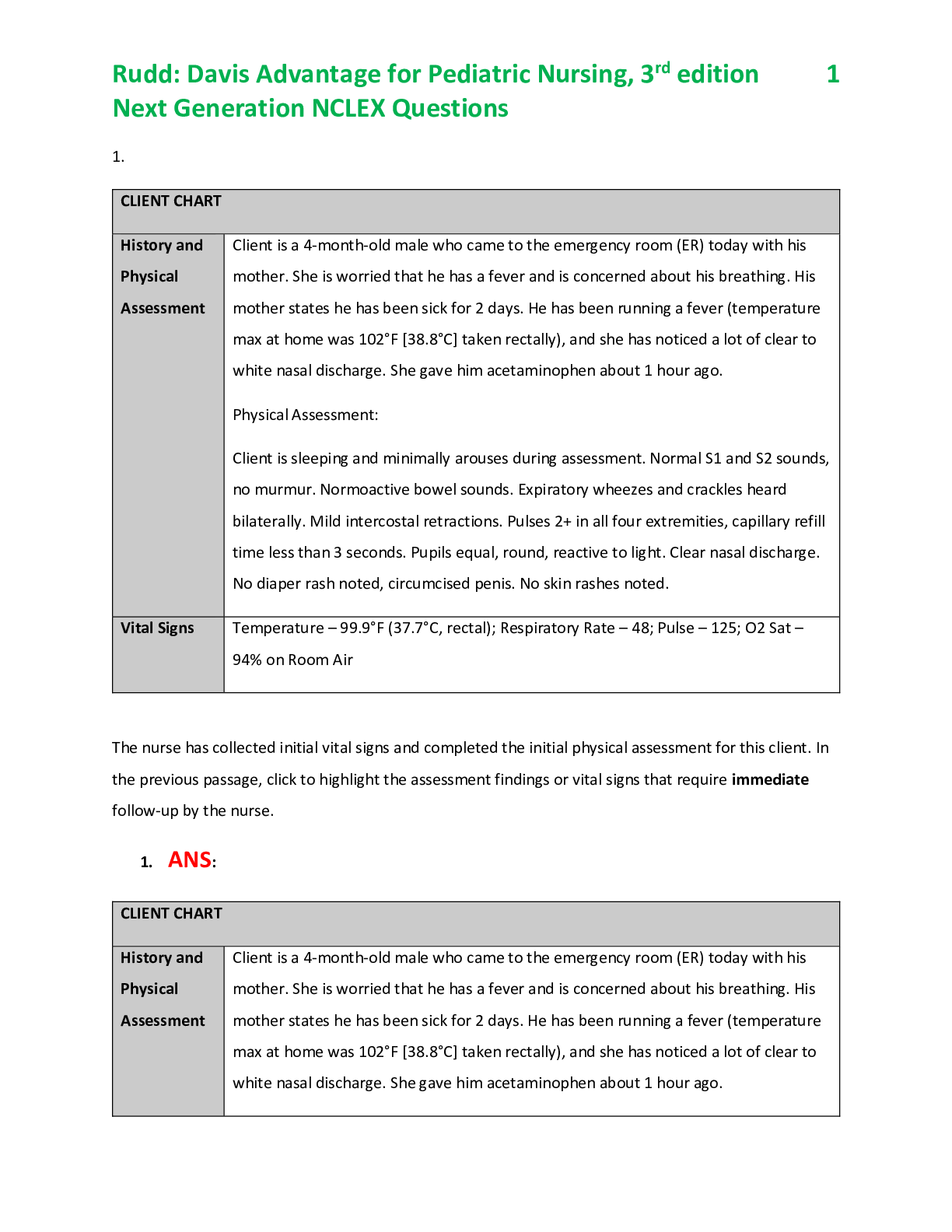Azure GI RESP and URINARY Nclex style questions key
Document Content and Description Below
1. You are presenting a class to a local women's group on gastrointestinal (GI) problems. How would you tell these women that GI function is best maintained? 2. You are caring for a 7-month-old i... nfant who has been brought to the clinic by his mother. The mother reports that the baby has not had a bowel movement in 4 days. The nurse will recommend which of the following? 3. Your patient has been instructed to take polycarbophil (FiberCon). What should be an instruction on the use of this drug as a laxative you would give your patient? 4. A new mother had to have an episiotomy during the birth of her baby. Two days after delivery the patient is in need of a laxative. What will the nurse administer? 5. Your patient is being sent home with orders for a laxative PRN. You are doing patient teaching on the use of a laxative. What will you inform the patient is one of the most common adverse effects of a laxative? 6. A patient calls the clinic and reports to the nurse that she is not feeling good. The patient goes on to say that they were recently prescribed a laxative. The nurse knows that the patient takes other medications for congestive heart failure and osteoarthritis. What should the nurse question the patient about? 7. A patient who is taking metoclopramide (Reglan) has come to the clinic for a follow-up visit. The nurse will be most concerned about a drug-drug interaction from which of the following drugs that the patient is taking? 8. A patient in the clinic is planning a trip to Mexico. This patient has a history of contracting traveler's diarrhea when visiting other countries. The physician decides that the patient will be prescribed rifaximin (Xifaxan), an antibiotic that affects bacteria in the intestine. What should the nurse tell the patient concerning this drug? 9. One of your clinic patients is found to require a laxative for the treatment of chronic constipation. You know that this patient has a history of congestive heart failure (CHF). What medication would this patient be a candidate for? 10. A man with irritable bowel syndrome whose main complaint is constipation calls the clinic to see if he could receive a prescription for tegaserod (Zelmac), which was helpful for his coworker who recently started taking the drug. What would the nurse explain to the man? 11. Psyllium hydrophilic mucilloid (Metamucil) may be used occasionally as an antidiarrheal because it does what? 12. Systemic antidiarrheals, such as loperamide (Imodium), decrease the number and liquidity of stool by which of the following mechanisms? 13. Your patient calls the clinic and tells you they are so tired they just want to sleep. In talking with the patient you note the patient has had diarrhea and has taken loperamide (Imodium). You know that a common side effect of loperamide (Imodium) is what? 14. Bismuth salts (Pepto-Bismol) is contraindicated in clients with which of the following conditions? 15. You are a home health nurse caring for a 72-year-old male in his home. He complains to you about diarrhea on an almost daily basis. What would you explain to this patient is a common cause of diarrhea in older adults? 16. What is first-line therapy for infants and children 1 to 4 years of age with diarrhea? 17. What antidiarrheal is used to reduce the volume of discharge from an ileostomie? A) ) 18. You are caring for a patient who has been prescribed a chemical stimulant laxative. In your patient teaching you include the information that this medication may have either a slow, steady effect or may cause severe cramping and rapid evacuation of the contents of the large intestine. What drug would you be teaching this patient about? 19. You are caring for an 89-year-old with frequent liquid stools. When preparing a plan of care for this patient what nursing diagnosis is a priority? 20. You are teaching a class to the nursing students on laxative medications. What medication would you talk about as a chemical stimulant? 21. You are caring for a patient who has had impacted stools twice in the past month. What would be an appropriate laxative for this patient? 22. You are a home health nurse who is caring for a patient with encopresis. The patient has been started on mineral oil. What would be an adverse effect that you would tell the patient/family about? 23. When would it be desirable to give your patient a laxative? (Mark all that apply.) 24. What is an indication for the use of caster oil as a laxative? (Mark all that apply.) 25. What are the pharmacokinetics of magnesium citrate? 26. What is an indication for the use of metoclopramide? 27. You are talking with the nursing students about drugs that affect gastrointestinal motility. Which drug inhibits intestinal peristalsis through direct effects on the longitudinal and circular muscles of the intestinal wall? 28. A patient presents at the Emergency Department (ED) complaining of abdominal pain. On assessment the nurse notes distention and drowsiness. The patient tells the nurse that they have an unusually dry mouth and a family member mentions “the patient had a 24-hour bug that lasted 36 hours.” What would be the most appropriate question for the nurse to ask? A) ?” 29. You are planning discharge teaching to a 77-year-old patient who has been prescribed loperamide PRN. What would you be a priority to include in your teaching? 30. A client receiving loperamide (Imodium) should be alerted to which of the following side effects related to this medication? 31. Why would a nurse encourage a patient to avoid using OTC medications to treat decreased acid? 32. You are talking with your nursing students about the drugs that affect the gastrointestinal secretions. What group of drugs would you tell the students is used to treat peptic ulcers by suppressing the secretion of hydrochloric acid into the lumen of the stomach? 33. A patient who requires digestive enzyme replacement therapy has been admitted to your unit. What would be an appropriate nursing diagnosis for this patient? 34. A patient's GI discomfort is prescribed antacids. Nursing interventions associated with this prescription should include what? 35. An adult patient is prescribed cimetidine (Tagamet). A nurse will instruct the patient that an appropriate dosage and frequency of cimetidine (Tagamet) is what? 36. You are developing a discharge teaching plan for a patient who is going to need pancreatic enzyme replacement. What will it be important to teach the patient? 37. A patient comes to the clinic complaining of acid stomach. The patient tells the nurse that it seems like they are always buying OTC antacids and they want a prescription to “cure the problem.” What would the nurse assess specifically for? 38. A patient with a duodenal ulcer is receiving sucralfate for short-term treatment. What will the nurse advise the patient to avoid? 39. A patient has been prescribed esomeprazole (Nexuim). What statement by the patient indicates that he has a good understanding of his newly prescribed drug? ………………………………………CONTINUED………………………………………….. [Show More]
Last updated: 1 year ago
Preview 1 out of 26 pages
.png)
Reviews( 0 )
Document information
Connected school, study & course
About the document
Uploaded On
Feb 13, 2021
Number of pages
26
Written in
Additional information
This document has been written for:
Uploaded
Feb 13, 2021
Downloads
0
Views
40

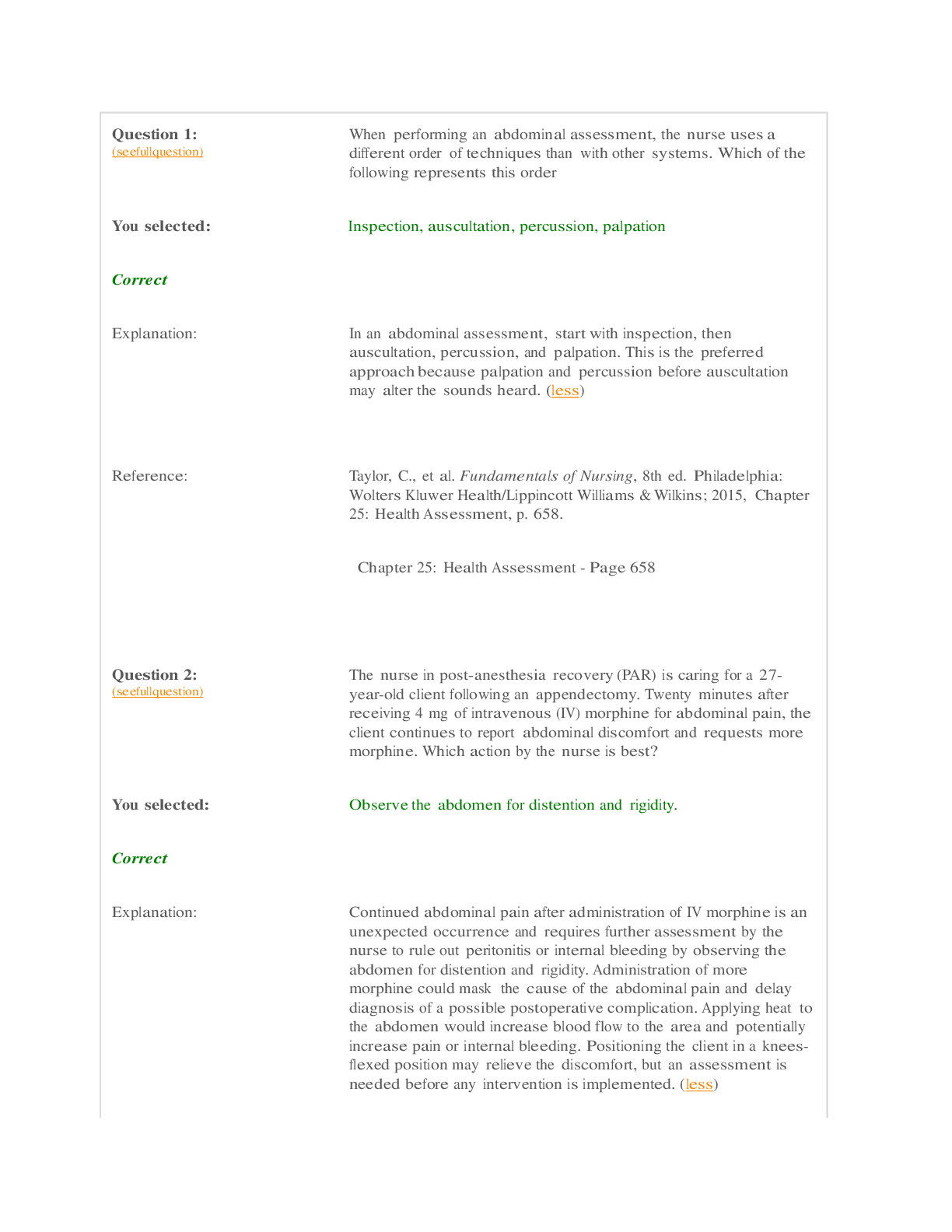


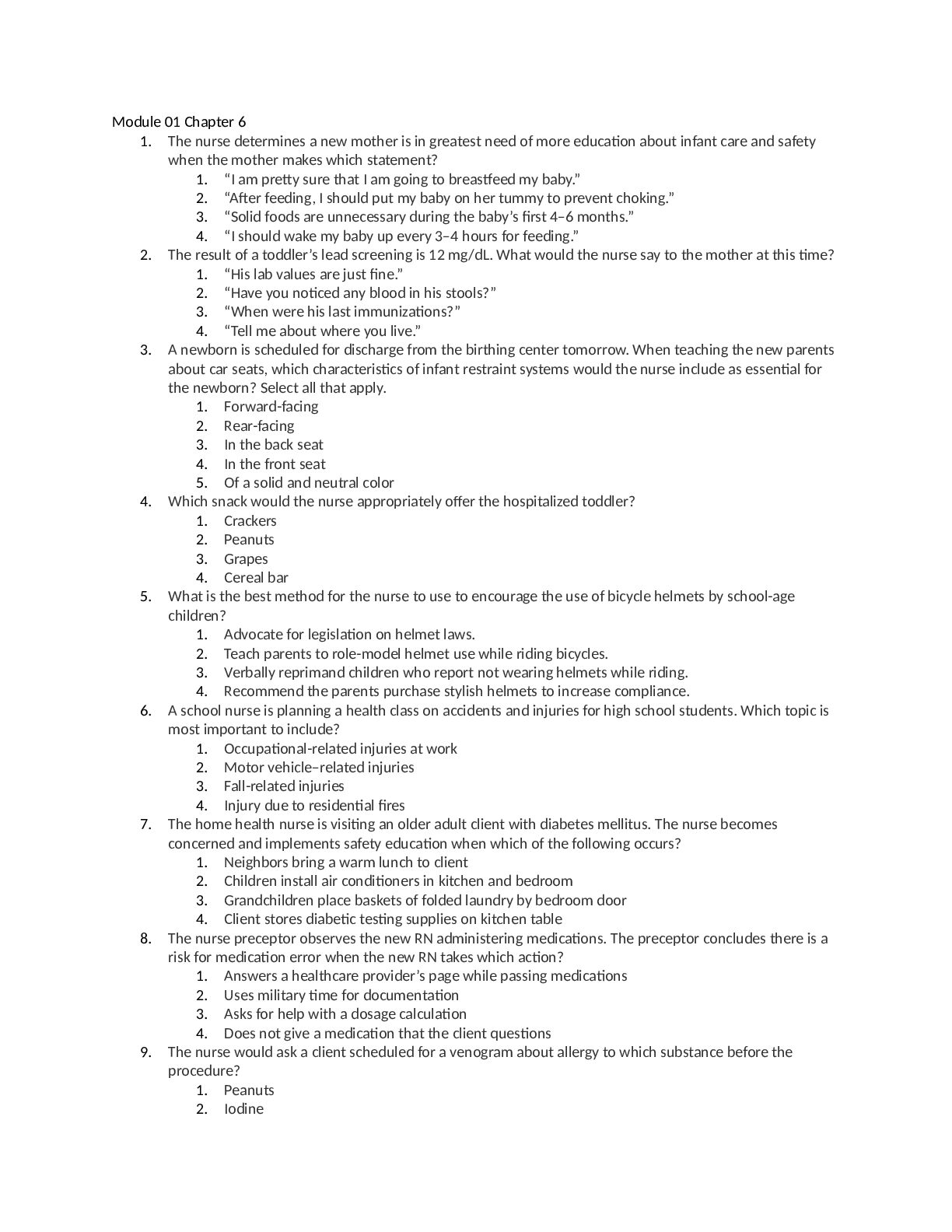


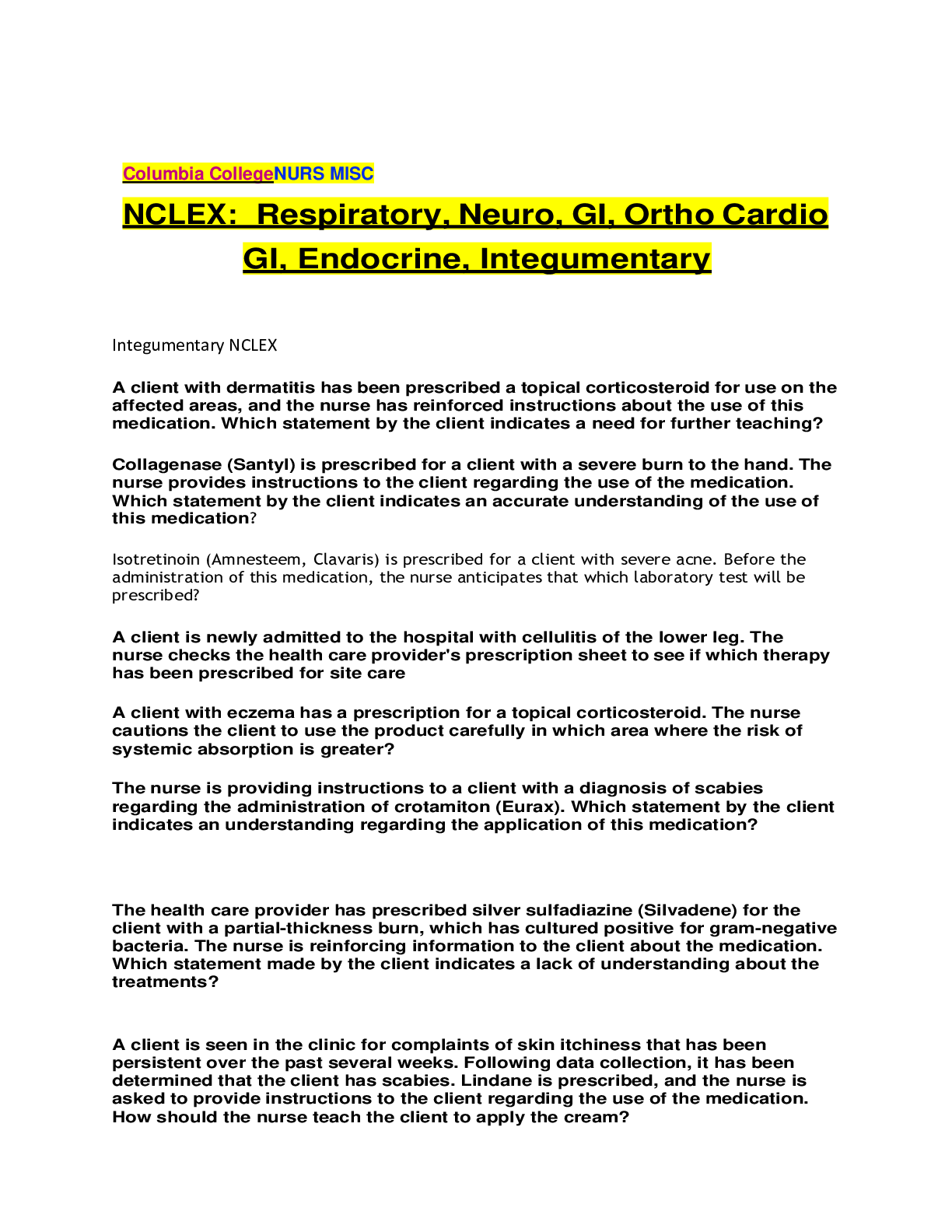
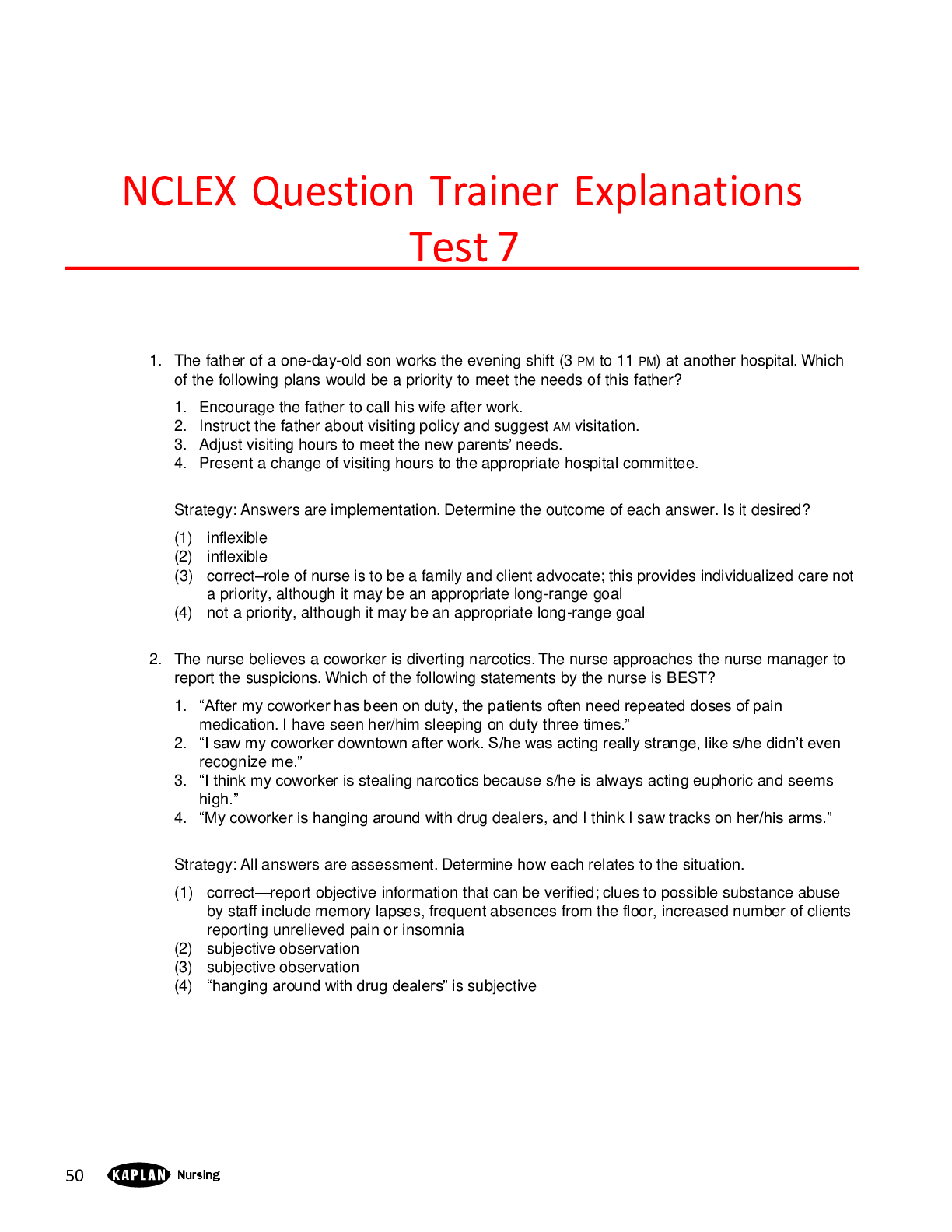
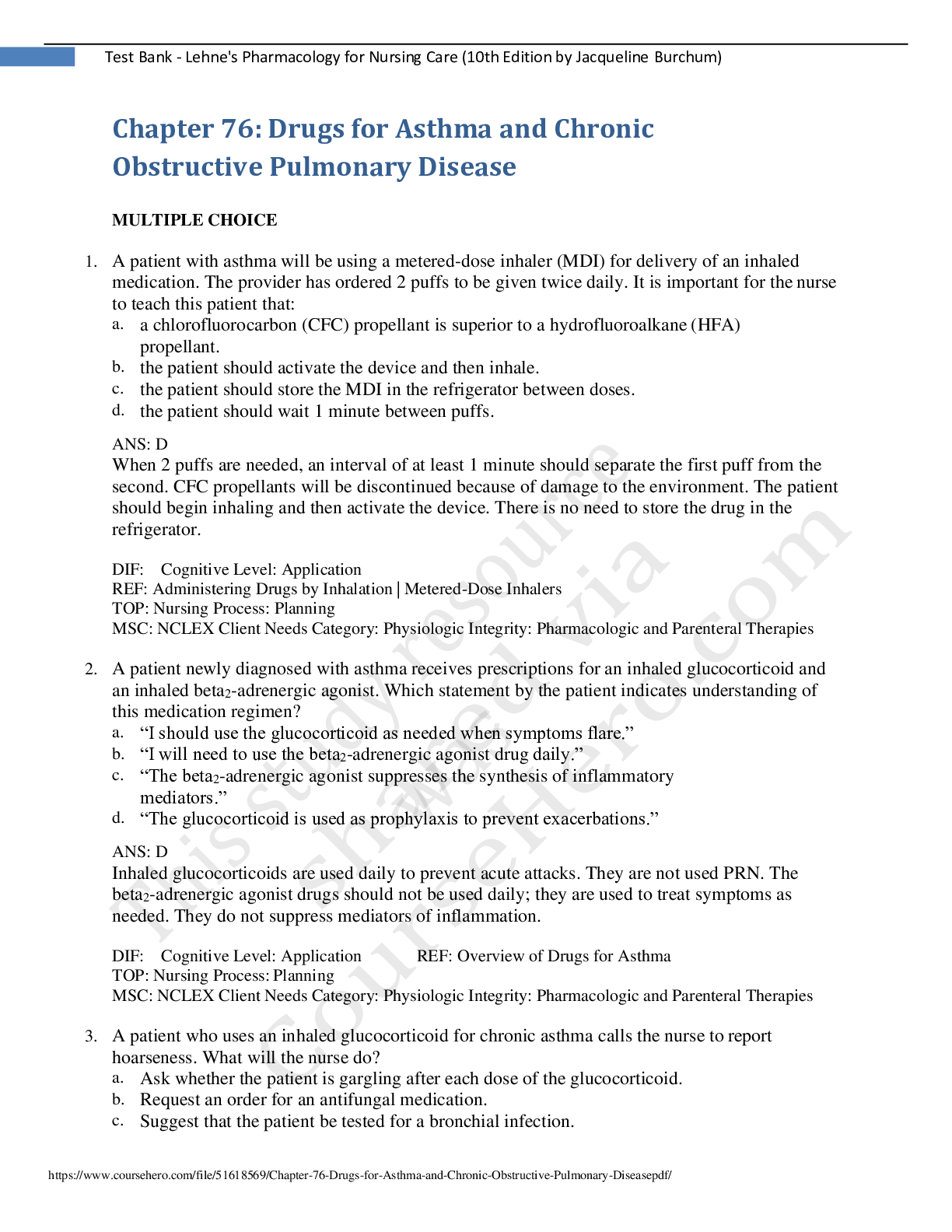

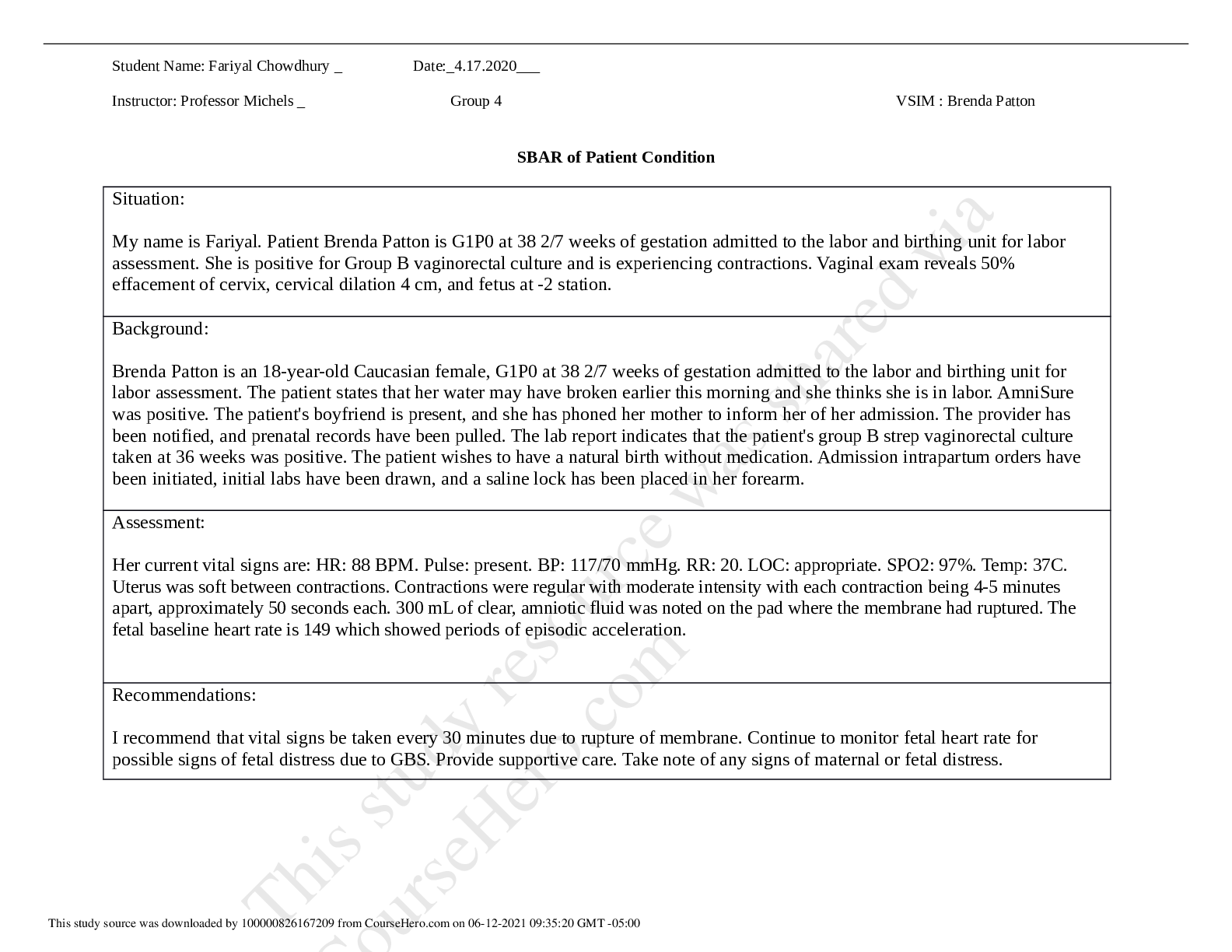

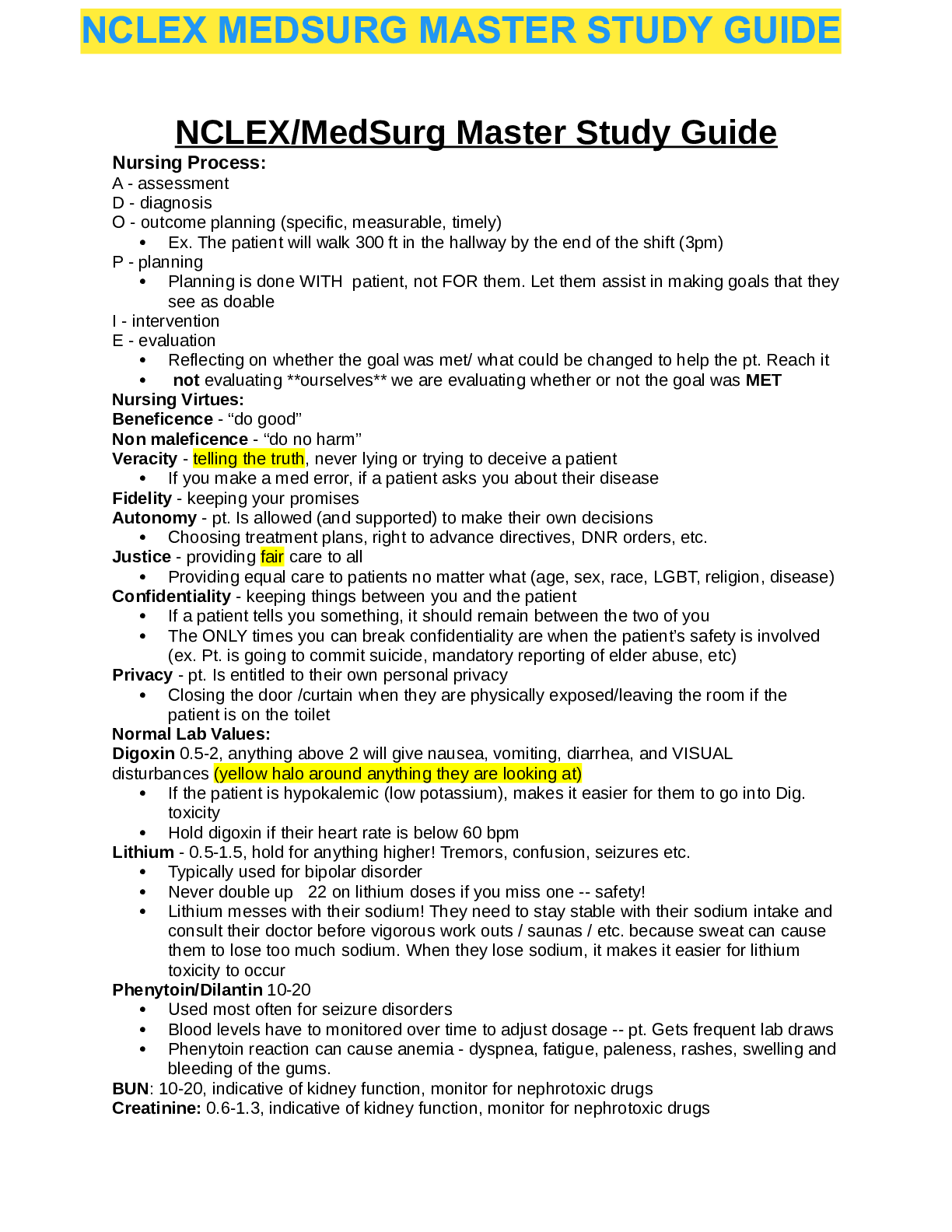
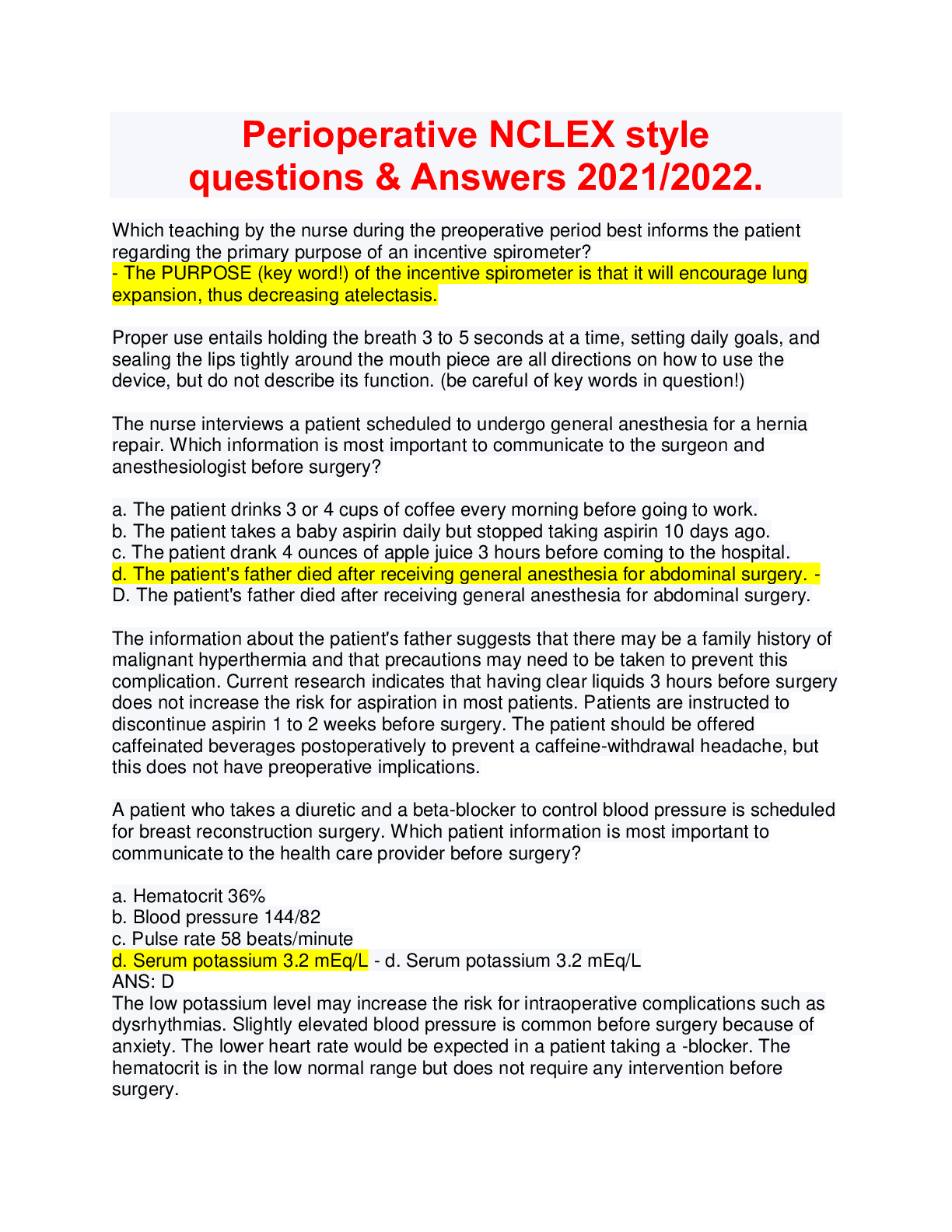

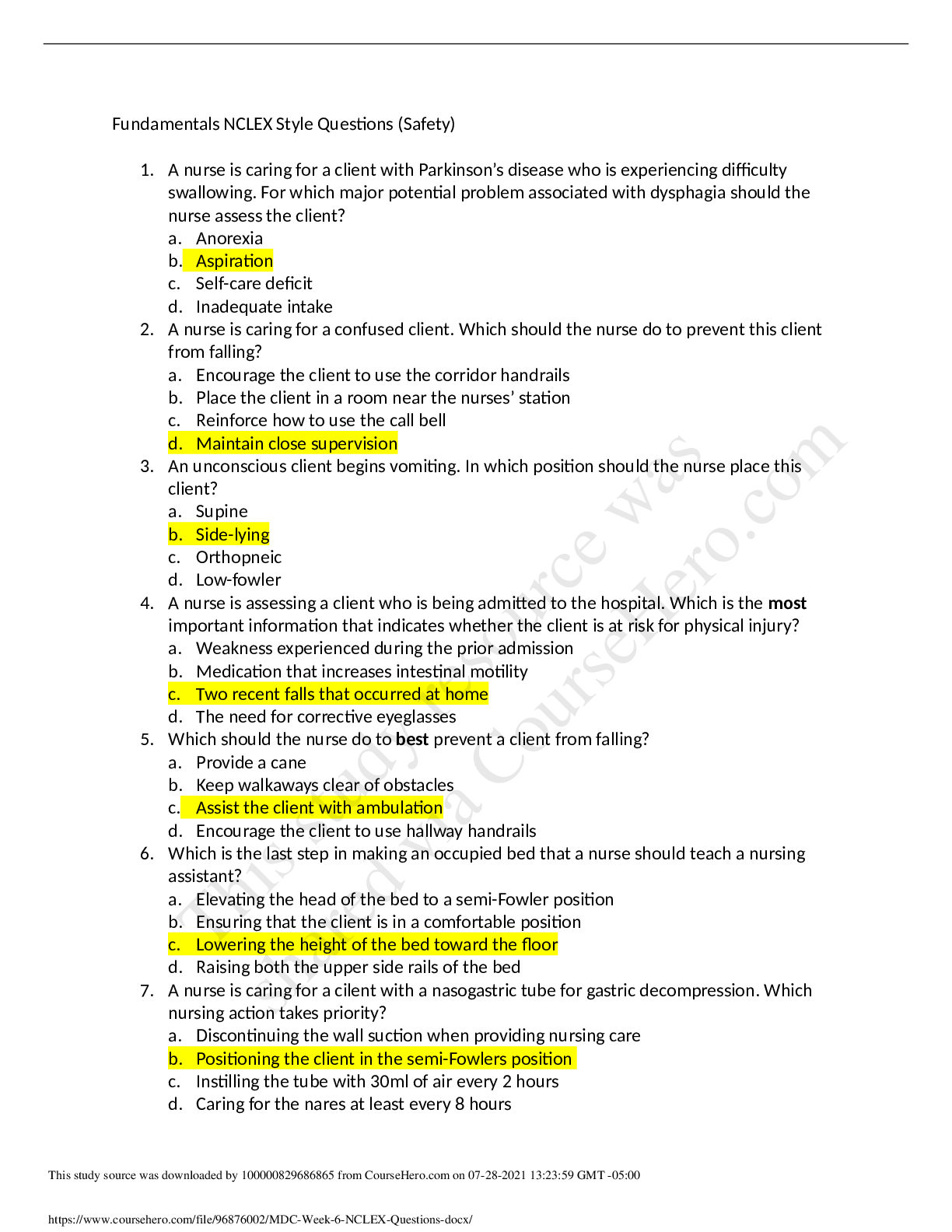
Gastrointestinal RESP and URINARY Nclex style questions key 2022.png)
